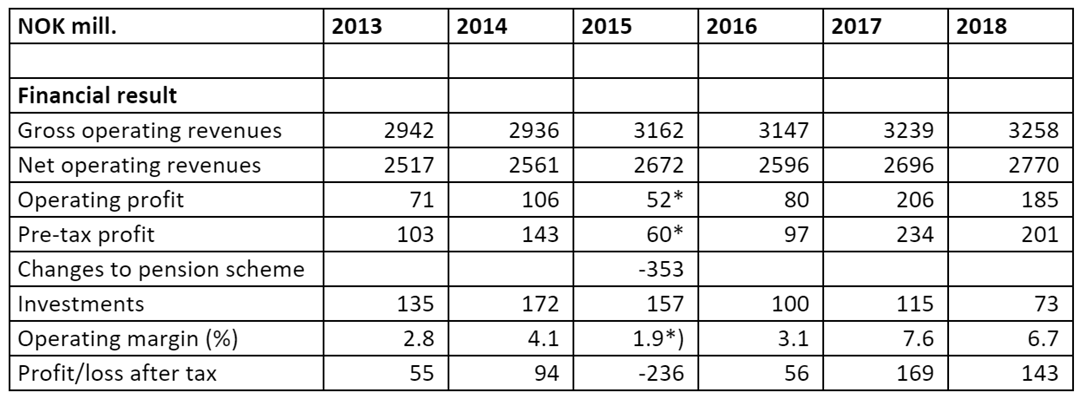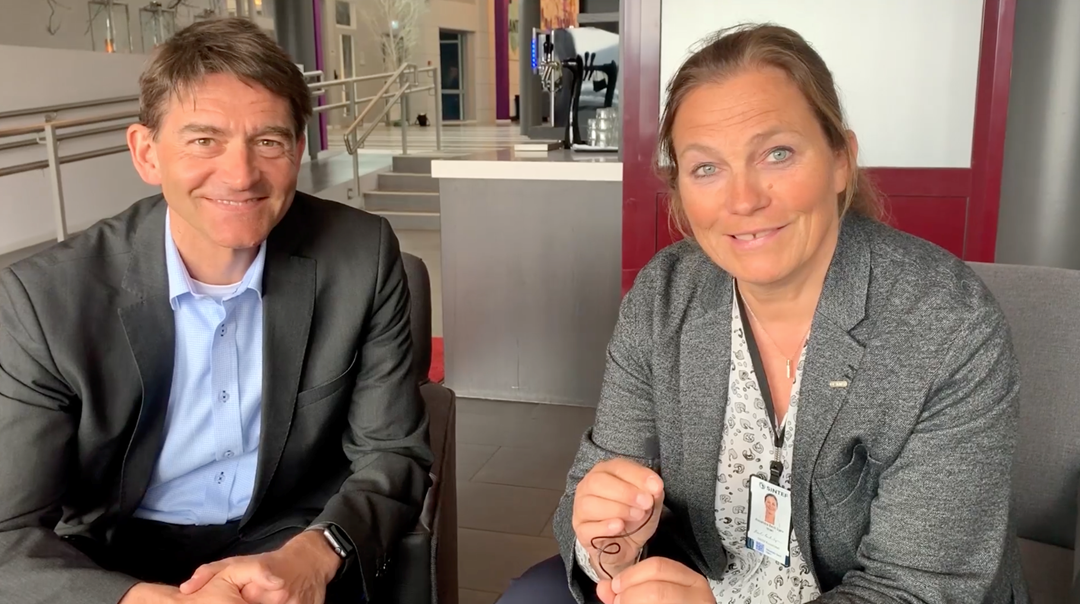Net operating revenues were NOK 2.77 billion, an increase of 2.7 per cent on 2017. The ordinary operating profit was NOK 185 million, compared with NOK 206 million in 2017. Corrected for non-recurring effects, the operating profit in 2018 was somewhat better than the previous year.
Overall, this resulted in a net operating margin of 6.7 per cent, compared with 7.6 per cent in 2017. SINTEF's aim is to achieve a minimum net operating margin of 5 per cent.
"I am pleased with SINTEF's financial results for 2018. After many challenging years, SINTEF needs revenues at this level to enable us to invest in our research so that in the years ahead we can participate in promoting wealth creation and developing effective solutions that are beneficial to society", says SINTEF's CEO Alexandra Bech Gjørv.
SINTEF is a foundation that invests its profits in new research. In 2018, NOK 73 million was invested in laboratories, scientific equipment and other business assets. In the last ten years, SINTEF has invested more than NOK 1.3 billion.
The company's financial position is robust. As of 31 December 2018, SINTEF has equity amounting to NOK 2,500 million, which constitutes 59 per cent of its total capital. This capital is mainly invested in the ownership of the research companies and in laboratories and property connected with research activities.
Restructuring and a new Group strategy
In recent years, a major restructuring has taken place in SINTEF, involving a dedicated focus on sales activities, cost reductions and other measures designed to promote good results. Cost reduction measures during the period 2015-2017 have resulted in combined annual savings of NOK 300 million. Organisational changes have been implemented, including the merger of multidisciplinary research groups to form fewer and larger institutes.
In 2018 SINTEF has been developing a new Group strategy, which was approved by the Board in March 2019. SINTEF builds on its strength as an independent, market-oriented research institute offering high levels of scientific excellence. It will now, to a greater extent than before, exploit its multidisciplinary expertise to assume the role of development partner. SINTEF's ambition is to be a world-leading research institute that promotes competitiveness and solutions that are beneficial to society. Its future activities are now rooted in the UN's sustainability goals, and it will be in the market for growth opportunities that support these goals.
Customers
During 2018, SINTEF worked on 4,985 projects for 3,534 small and large customers. 47.5 per cent of the gross operating revenues of NOK 3.3 billion were derived directly from assignments for Norwegian and overseas private sector organisations, while 10 per cent came from public sector customers. Only eight per cent of SINTEF's revenues come from basic governmental grants. This is a far lower level of public funding than is the case for corresponding institutes in the rest of Europe.
International sales amounted to NOK 407 million. Thirteen per cent of SINTEF's operating revenues were generated by international projects. In 2017 SINTEF had customers in 61 countries worldwide, and EU-funded projects constituted about 50 per cent of international sales.
Participation in the major, long-term research centres which are partly financed by government entails significant interaction with Norwegian and overseas clients. SINTEF is currently participating in nine Centres for Research-Based Innovation and eight Centres for Environment-Friendly Energy Research, which were established in 2016 and 2017. Taken together, these activities involve the participation of just over 200 industrial enterprises.
Research
Publication contributes to creating awareness of, and reinforcing, scientific quality, which is essential to success in the market and to recruiting the best research talent. Our aim is to publish at least one peer-reviewed scientific publication per research scientist per year. In 2018 the figure was 0.80 publications per research scientist per year, compared with 0.95 and 0.71 in 2017 and 2016, respectively.
In 2018, SINTEF was awarded coordination responsibility for a new research centre that will contribute to achieving close to zero emissions from operations on the Norwegian continental shelf by 2050. This centre, called "LowEmission", has been promised NOK 120 million in funding by the Norwegian Government. Moreover, a number of oil companies and oil industry suppliers will contribute with funds, providing the centre with a financial framework of almost NOK 350 million over eight years.
SINTEF's international standing is significant for the effective exploitation of research funding in Norway. For many years, SINTEF has been the largest Norwegian participant in the EU's research programmes. Participation in the EU's research arena is key to enhancing the quality of SINTEF's scientific output, enabling it to remain in the forefront of international research in fields such as ICT, biotechnology, energy, nanotechnology and materials science. As of March 2019, SINTEF has been granted participation in 166 projects linked to the EU's Framework Programme Horizon 2020, involving funding pledges from the EU amounting to EUR 116 million.
Commercialisation of research results
SINTEF consolidated its commercialisation activities in 2018 by establishing the SINTEF Venture V seed fund, which plans to invest in the development of new spin-off companies emerging from research groups at SINTEF and NTNU.
The fund's investment capital is NOK 500 million, of which SINTEF's share is NOK 110 million. The European Investment Fund (EIF) is contributing NOK 155 million, and a number of Norwegian private sector investors are also investing in the fund.
At the end of 2018, SINTEF had 17 start-up companies in its portfolio, which during the year have received a total of NOK 40 million from SINTEF Venture funding. If one takes into account other investors and the public sector funding agencies, these companies have received a total of NOK 161 million in 2018.
In 2018, Zivid AS was awarded the Research Council of Norway's Innovation Prize and the Norwegian Tech Award. The company Zivid was founded in 2015 as a spin-off from SINTEF's research groups. Zivid has developed an advanced 3D camera that provides robots with vision, opening up completely new possibilities to the industry.
Personnel
At the turn of the year SINTEF had 1,944 employees. Fifty-six per cent of the research scientists in SINTEF have a doctoral degree. The proportion of women among our research scientists is 30 per cent, and 37 per cent among managerial personnel.
Twenty-four per cent (469) of SINTEF's employees come from a total of 72 countries outside Norway. SINTEF's international employees provide a valuable source of scientific and cultural expertise.
Outlook
Wider society is undergoing a transformation of greater impact and at a higher tempo than ever before. Digitalisation, automation, artificial intelligence, new materials and advanced robotic technology are driving enormous changes in all aspects of social and working life. SINTEF has considerable skills and expertise in these fields, and is well qualified to make an active contribution to successful transition processes in both the private and public sectors.
Societal transformation calls for an increasing degree of multidisciplinary approaches and technological know-how. What were once distinct fields and sectors are becoming increasingly merged because the technology they use is shared. The interplay between people, technology and societal security is crucial to the development of effective systems and methods. Thus, in 2018 SINTEF implemented measures aimed at creating a closer integration of its technological, scientific and social science research activities.
The challenges generated by climate change, and the need to develop a zero-emissions society, became even more evident with publication of the latest IPCC report presented in the autumn of 2018. The green transition represents a key motivation for restructuring. SINTEF intends to concentrate its efforts on climate change technology and adaptation, renewable energy, energy storage, energy efficiency and CO2 capture and storage (CCS). We are assigning high priority to our future research activities in these fields, and wish to accelerate research connected with climate-positive technologies that can contribute to the removal of greenhouse gases from the atmosphere.
Establishment of the institute SINTEF Ocean enables SINTEF to adopt a more integrated and vigorous approach to the aquaculture industry. In the decades ahead, the potential for increased economic growth connected with the oceans is significant and of key importance for Norwegian wealth creation and a sustainable global food supply. In December 2018, the Norwegian government decided on the development concept for the Ocean Space Centre, a future knowledge arena for ocean space technology. It is crucial that this decision is followed up by the public authorities so that the Ocean Space Centre can become a reality as soon as possible.
Financial key figures for the SINTEF Group (2012-2017)




